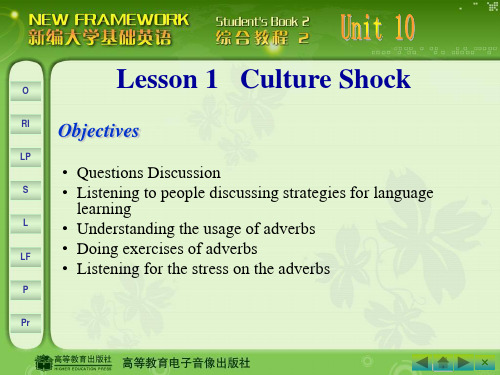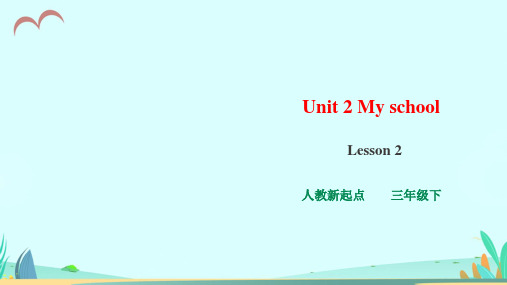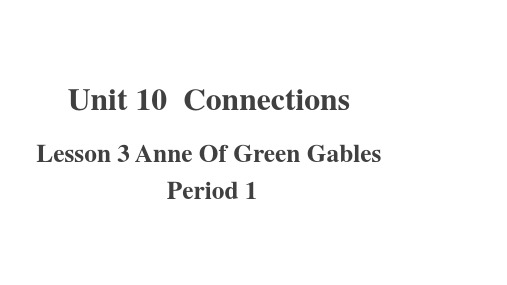Unit 2 Lesson 10 Where Do They Live 课件 2
新编大学生基础英语综合教程第二册教学课件Unit 10--Lesson 1

LP
that is not even, smooth, or balanced
S
e.g.
[= uneven]
L They walked along the jagged, irregular coastline.
LF Beamish only returned to Britain at irregular intervals.
S
area you are talking about
e.g.
L
We asked one of the locals to recommend a restaurant.
LF
Local residents are looking forward to the coming
Asian Games.
P
Pr
P
Pr
×
O Listening
RI
Transcript 10.1
LP Carl: I’ve been living in Hong Kong for two years. I’m a lawyer. I got the job because I can speak Chinese quite well
L
It’s incredible how much Tom has changed since he met
LF Sally.
I find it almost incredible that no one noticed these
P
errors.
Pr
×
O Lexical Preparation
RI
RI
10. technical adj. connected with knowledge of how
人教版新起点三年级下册英语Unit 2 My school Lesson 2 课件

看图片,自问自答。
Do you have a ___c_o_m_p__u_te_r__ro_o_m____?
No, we don’t.
Watch and learn
看视频,初步学习课文内容。
Do you have a _l_i_b_r_a_r_y_?
Yes, we do.
Watch and learn
classroom
Quick response
哪个单词闪动了,就大声说出哪个单词。
first floor second floor first floor second floor
third floor third floor
first floor second floor third floor
3. 你想说“不,我们没有。”,你应该说 ___B____源自A. Yes, we do.
B. No, we don’t.
Make a summary What have we learned today?
1、学习了句型: Do you have a library? 你们有一个图书馆吗? Yes, we do. 是的,我们有。(肯定回答) No, we don’t. 不,我们没有。(否定回答) But we have computers in our classrooms. 但我们的教室里有电脑。
Unit 2 My school
Lesson 2
人教新起点 三年级下
Look and say
看图片,说单词。
first floor second floor third floor
Look and say
看图片,说单词。
toilet
library
冀教版八年级下Unit3 Lesson 14 Amazing Animals课件(共35张PPT)

Do you know these animals?
Let’s come to this lesson.
Listen to the passage and write true (T) or false (F). (T) 1. Jerboas have long ears and look like mice. (F ) 2. Jerboa’s front legs are longer than their back legs. (T) 3. Jerboas are good at jumping. (F ) 4. Jerboas live all over Europe.
Name: Kiwis
Where do they live? They live in New Zealand. _________________________ What makes them amazing? They are birds, but they can’t lay big eggs. fly. They ___
Name: Flying fish
Where do they live?
All over the world. _____________________
What makes them amazing? A flying fish looks like a bird ___________________________ with its large wings. _________________
(F) 10. Flying fish can fly in the sky. (T) 11. Flying fish has large wings. (F) 12. Flying fish live in the sea in Africa. (T) 13. Flying fish flies out of the water to avoid enemies.
五年级上册(人教新起点版2012)Unit 3 Animals lesson 3 课件

C——Let's write my house
dog food
clever
dog Appearance
Feeling
strong
run fast play
big eyes a long tail
Showing time
书写规范, 层次清晰!
1 Quickly 2 Quickly & Correctly
_D_o_e_s_a_p_e_n_g_u_in__liv_e__o_n_t_he__ic_e_____? Yes,___It___ _d_o_e_s__. 3. Elephants live __o_n__ the __g_r_a_ss_la_n_d__ (草原上)or __I_n____ the __f_o_re_s_t__. ( 森林里) (根据汉语补充句子)
A——Let’s talk
1.Where do they live?
in the forest
animals
in the bamboo forest
bamboo
2.What do they eat?
on the grassland/ in the forest
leaves and grass
on the ice
Practise
4. It is interesting,__is_n_’t__ ____it___? (改为反义疑问句)
5. Amanda and Sally like cute animals. (改为否定句) Amanda __a_n_d_ Sally ___d_o_n_'t_ ____li_ke___cute animals.
1
Share your paper about your favourite animal with your group members .
冀教版(三起)英语四年级下册同步课件 Unit 3 Lesson 16

A. My address is 198 Ninth Street. B. By bus. C. I live in a house near the park. D. No, it’ s near the cinema. E. No, my dad drives me.
Exercises
三、阅读短文,选择正确的选项。
Hello, my name is Lily. I'm nine years old. I live in a big house. My address is 186 Wusi Road. It is far from the school. So I go to school by car every day. But my house is near the library. So I always go to the library by bike. Jack is my friend. He lives in a house near the school. So he walks to school every day.
说得最标准!
2 Let’s chant!
How do you go to school? By bus, by bus. How do you go to school? By bike, by bike. How do you go to school? By car, by car. How do you go to school? On foot, on foot.
xxx小学
2. My father drives a c_a_r_______ .
3. I go to school on f_oo_t_______.
Unit 10 Lesson 3 Anne of Green Gables 精品课件 (2)

While-reading
2. How did Anne feel after hearing Marilla’s words? When Marilla insisted that a boy should be sent, Anne cried and felt sad because she was not wanted. Her hope collapsed. When Marilla said there was no need to cry so about it, Anne felt she was not understood. When Marilla mentioned Anne was not eating, Anne felt she was in depths of despair. When Marilla said good night to Anne, Anne was disapproving.
Marilla decided to put Anne __to__b_e_d_. _S_h_e_w__a_s_i_n_t_h_e_d_e_p_t_h_s ___ _o_f_d_e_s_p_a_ir_____________.
Bed time She went to bed, frowning most resolutely.
⸙ And up-stairs, in the east gable, a lonely, hearthungry, friendless child cried herself to sleep.
Post-reading
Think and answer the questions.
1. Do you think Marilla and Matthew are used to being around children? Find examples from the story.
高英Lesson10(Book 2) The Sad Young Men
I. Background Knowledge
C. Other literary figures: --Gertrude Stein --E. Hemingway
1. Gertrude Stein (1874-1946) American author and patron of the arts. A celebrated personality, she encouraged, aided, and influenced—through her patronage as well as through her writing—many literary and artistic figures. The fifth and youngest child of the Daniel and Amelia Stein family, Gertrude was born on February 3, 1874 into upper middle class surroundings in Allegheny, Pennsylvania. In 1902 she went abroad and from 1903 until her death lived chiefly in Paris. When she was 3 years old the family moved to Vienna and then on to Paris before returning to America in late 1878. "So I was five years old when we came back to America having known Austrian German and French French, and now American English, a nice world if there is enough of it, and more or less there aer died suddenly, and the oldest brother Michael assumed the position of earning a living for the family. The Steins moved to San Francisco where Gertrude became intrigued by the theater and opera...a passion she would continue after she moved to Baltimore in 1892 to live with a wealthy aunt. "...how strange it was for me coming from a rather desperate inner life I had been living for the last few years to a cheerful life of all aunts and uncles." Gertrude entered Radcliffe College in 1893. As a student she developed a special philosophical relationship with her teacher, William James. James told her, "I hope you will pardon me if you recognize some features of my ideal student as your own."
鲁科版英语五年级下册Unit 2 Lesson 3 They are in the zoo课件
1. 听音跟读L3,读熟签字。 2. 熟记新单词和重点句型。
(给)
13
(自读第三段)
(读一读,找一找,划一划)
What does Li Mei’s aunt say to her?
Don’t feed them too much, my dear.
14
He has _to_o__m_u_c_h__ homework.
15
Don’t eat _to_o__m_u_c_h__ .
16
(读一读,找一找,划一划)
(自读第三段W)hat does Li Mei’s aunt say to her?
Don’t feed them too much, my r.
17
Ha-ha. I’m your dear, but I’m not a deer,” says Li Mei. They all laugh.
2
1 Let’s read.
There are three pandas in the zoo. Li Mei is happy to see them. She says, “Let’s take a picture with them.”
“OK. But don’t walk on the grass” , says Li Ming.
11
They go to see the deer. Li Mei gives them some grass. Her aunt says, “Don’t feed them too much, my dear.”
12
They go to see the _d_e_er_. Li Mei g_i_v_e_s them some _g_r_a_ss_.
三年级上册英语优质教案-Lesson 12 More Letters 冀教版
教学设计Unit3 Look at me!第五课时宿松县许岭镇碎石小学教学目标:1、能听说、认读关于身体部位body, leg, arm, hand, head,foot 单词,并能用英语介绍自己身体的这几个部分。
2、能听懂Let's do 部分的指示用语,并按指令做出相应的动作。
3、进一步培养学生模仿发音和语调的习惯,奠定语音语调的基础。
教学重点:进一步学习身体各部位的名词body, leg, arm, hand, head,foot。
教学难点:1、Let’s do 部分是关于身体活动的多个指令,不强求学生认读或准确说出,能根据指令正确理解并做出快速反应即可。
2、head和hand 发音易混淆。
教具准备:1、教师准备body, leg, arm, hand, head,foot 的卡片和图片。
2、教师准备Let’s do 部分的图片。
3、ppt课件。
教学过程:1.打招呼(Greetings)Hello,boys and girls.How are you?I’m fine,thank you.And you?I’m fine,too.2. 热身、复习(Warm-up/Revision)(1)教师带学生一起做律动(eye eye 刷刷刷ear ear啊啊啊nose nose呼呼呼mouth mouth yummy yummy yummy)(2)复习歌曲Touch your eyes.3.呈现新课(Presentation)(1)教师出示zoom头部图片,复习其部位的名称eye, face , ear, nose, mouth ,用句子Look at me,This is my…进行表述,找两至三名学员上台表演说句子。
(2)教师布置任务Let’s make a puppet从而导出身体各部位的名称词body, leg, arm, hand, head,foot,将图片逐个贴在黑板上,课件展示单词,学生书空单词。
电子课件-《新模式英语(2)》-A01-7633 book 2-preunit
LESSON
D Practice the conversations.
Mario: Hi, Lien! Lien: Hello, Mario. Mario: How are you today? Lien: I’m nervous. Mario: Me, too.
Jonathan: Hi, Alexi! Alexi: Hello, Jonathan. Jonathan: How are you today? Alexi: I’m sad. Jonathan: Not me. I’m happy today.
LESSON
Listening Script
1.Mario: Hello, what’s your name? Lien: My name is Lien. Mario: Nice to meet you, Lien. I’m Mario. Lien: Hi, Mario. Nice to meet you, too. Mario: Welcome to our class, Lien.
LESSON
Glossary
Vocabulary angry a. 发怒的,生气的 feeling n. 感觉;〔复〕 感情,情绪 hungry a. 饥饿的 nervous a. 紧张的 registration n. 登记,注册 sad a. 悲伤的;凄惨的,可悲的 tired a. 疲乏的,累的
LESSON
E Listen and write the phone numbers you hear.
EXAMPLE: _(_6_1_7_)__5_5_5_-_9_2__6_4_____ 1. _____(6_1_9__) _5_5_5__-6__3_9_1___________ 2. _____(3_1_2__) _5_5_5__-5__1_0_0___________ 3. _____(7_8__6_)_5_5__5_-_2_8_5_2___________ 4. _____(9_1_5__) _5_5_5__-5__2_8_0___________ 5. _____(3_2__3_)_5_5__5_-_3_9_6_7___________ 6. _____(3_4__7_)_5_5__5_-_1_7_4_3___________
